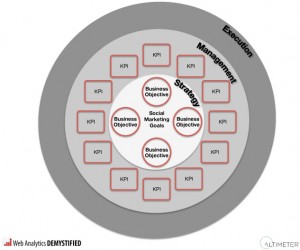Like with everything that is done in business, it has to be done for a reason or else it’s just wasted effort. Measuring simply anything from your social media initiative without a reason behind it is just that – a wasted effort. In reading “Social Marketing Analytics” by John Lovett and Jeremiah Owyang this point is further proven. In measuring social media what you measure needs to be attached to specific business goals, not measured just because the number is available.
The paper by Lovett and Owyang starts off with a good definition of what Social Marketing Analytics is (what can I say I like when things are plainly defined):
“Social Marketing Analytics is the discipline that helps companies measure, assess and explain the performance of social media initiatives in the context of specific business objectives.”
Pay particular attention to the last part – “…in the context of specific business objectives.” What did your social media initiatives achieve for your company? Social media measurement is not just looking at the numbers of fans go up or down (or whatever shiny number there is out there) but looking at the end result of what your work achieved for your organization. Very simple but great stuff.
Lovett and Owyang write about a three layered approach to Social Media Measurement, which I feel is effective in further demonstrating the need for measurement:
1. Strategy: The reason behind the initiative.
2. KPI (Key Performance Indicator): What the measure of success or failure is with this initiative.
3. Granular Metrics: The information or inputs that need to be gathered to allow you to formulate the KPI.

Social Marketing Analytics Framework
In keeping the paper accessible to general business practitioners Lovett and Owyang present four major strategies (although they mention that there are more) along with suggested corresponding KPIs. I’ll leave the KPIs for more in depth reading in the paper but I thought I’d present the strategies as these apply to many businesses:
1. Foster Dialog: Developing conversation around your company or brand. This is the development of content to create interest in what you’re trying to achieve.
2. Promote Advocacy: The development of ambassadors for your organization. Encouraging people to actively discuss and promote your brand online.
3. Facilitate Support: Provide a channel where customers are able to get their problems/concerns addressed in a timely manner ( Ex: @Rogershelps or @Toronto311).
4. Spur Innovation: The development of active discussion around your brand or initiatives focusing on the topic of improvement. Essentially putting like minds together online in developing ideas to make things better.
Overall in reading this paper it really puts it out there that:
A: Knowing what you want to achieve with social media is important and,
B: Measuring your progress (and not wasting your time) needs to be followed right after.
I really encourage you to check out the paper as it’s a great first step in developing a measurement program. I would also add that while it’s a helpful framework, it’s not a complete instruction guide. Measurement, like any other business initiative, needs to be scaled and customized to fit with the specific organization. Measurement and tools that apply for a large multinational corporation don’t have the same effectiveness for a smaller, local business.
